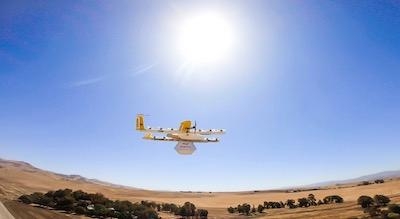Thu, Aug 04, 2022
Airworthiness Certification Replaces Weight Consideration in Accident Criteria as Board Prepares for UAV Delivery
The NTSB has addressed shortcomings in the previous definition of “unmanned aircraft accident” in a recently published rule to go into effect August 15.

The change is designed to help to address recent developments within the industry that have made the prior weight-based definition somewhat lacking when determining the board's response to aircraft accidents. Under the older definition, an “unmanned aircraft accident” was an occurrence associated with the operation of an unmanned aircraft that takes place between the time that the system is active, is associated with death or serious injury, or in which the aircraft is substantially damaged. A key dissatisfaction with the definition lay in the requirement that the UAV have a MGTOW of 300 lbs or greater, an addition that sought to limit the level of busywork sent to the NTSB after millions of drones made their way into American homes.
In May of 2021, the NTSB issued an NPRM proposing a change that would eliminate the weight requirement, instead replacing it with an airworthiness certificate or approval requirement. The NTSB said that the weight threshold is “no longer an appropriate criterion because UAS under 300 lbs are operating in high-risk environments, such as beyond line-of-sight and over populated areas. The NTSB explained that the new proposed definition would improve their ability to respond to significant safety events and advance the state of the industry as a whole, particularly in light of the expanding field of drone-based delivery services. Commercial operations using drones have been a point of concern from the public comment period, with the NTSB’s release quoting a citizen’s desire for UAS operations to be “subject to the same scrutiny as commercial manned operations.”
“A substantially damaged delivery drone may uncover significant safety issues,” says the newly released final rule. “The investigation of which may enhance aviation safety through the independent and established NTSB process. This amended definition will treat a UAS with airworthiness certification in the same manner as a manned aircraft with airworthiness certification, thereby enabling the NTSB to immediately investigate, influence corrective actions, and propose safety recommendations.”
The rule in its entirety has been published to the Federal Register under docket number NTSB-2021-0004.
More News
From 2023 (YouTube Edition): "Ain’t Your Daddy’s Super Cub”—Don Wade Co-owned by Don and Ron Wade—the former of Don’s Dream Machines, a storied >[...]
Pilot-Rated Passenger Reported That The Pilot Did Not Adequately “Round Out” The Landing Flare And The Airplane Bounced And Yawed To The Right Analysis: The pilot state>[...]
Dead Reckoning Dead reckoning, as applied to flying, is the navigation of an airplane solely by means of computations based on airspeed, course, heading, wind direction, and speed,>[...]
Aero Linx: Lake Amphibian Club This website is created and sponsored by the Lake Amphibian Club, to help spread the word about these wonderful, versatile amphibians that can land j>[...]
“I am deeply honored to be sworn in as NASA administrator. NASA’s mission is as imperative and urgent as ever — to push the boundaries of human exploration, ignit>[...]
 Classic Aero-TV: In Praise of Alabamas Patriot Aircraft USA
Classic Aero-TV: In Praise of Alabamas Patriot Aircraft USA NTSB Final Report: Cirrus Design Corp SR22
NTSB Final Report: Cirrus Design Corp SR22 ANN's Daily Aero-Term (12.21.25): Dead Reckoning
ANN's Daily Aero-Term (12.21.25): Dead Reckoning ANN's Daily Aero-Linx (12.21.25)
ANN's Daily Aero-Linx (12.21.25) Aero-News: Quote of the Day (12.21.25)
Aero-News: Quote of the Day (12.21.25)



